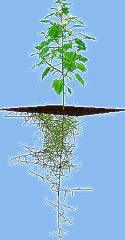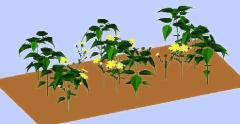|
December 21, 2000
A new research centre will use advanced mathematics and high performance computing to create
improved crops and lower pesticide use. The Centre for Plant Architecture Informatics (CPAI), formed by
CSIRO and the University of Queensland will be based at the University's St Lucia campus in
Brisbane, Australia.
CPAI Director Dr Peter Room says the Centre will combine the resources of pest management
scientists from CSIRO Entomology, with the University's supercomputing and scientific
visualisation resources, and UQ's Institute for Molecular Bioscience.
"The Centre will help in the design of improved crops through linking information on genes,
physiology, plant architecture, and ecology," Dr Room says. "We will also be able to reduce the use of pesticides by collecting more precise information about where pests are on plants, and how to target them with sprays.
Dr Room says the Centre will be using advanced computing techniques, pushing the boundaries of present technology.
"An even bigger challenge is to add new ways for people to interact with the information, such as
digital walks through virtual forests and digital 'flights' through the internal structure of virtual plants.
"We will investigate how environmental factors modify plant structure and how structure relates to
ecology and productivity. The ultimate goal is greatly-improved management of crops, forests,
pests and weeds."
"And along the way there will be plenty of fun playing with virtual plants," Dr Room says.
The Centre will provide biologists and farmers with computer-aided measurement, design, and
testing techniques that engineers and architects have used for many years. It has taken longer to
develop these technologies for plants because they are more complex than machines and
buildings, constantly changing shape as they grow.
In schools and universities around the world, movies of virtual plants are already being
downloaded from the Centre's website (http://www.cpai.uq.edu.au) to show students how cotton,
rice, red cedar and other plants grow.
Head of CSIRO Entomology Dr Jim Cullen says Dr Room brings 30 years of research experience
on interactions between insects and plants to the CPAI.
"He pioneered Australia's first computerised insecticide management system to help cotton
farmers and he led the team which achieved successful biological control of the floating weed
salvinia in Australia and a dozen other countries," says Dr Cullen.
 |
 |
|
|
Virtual insecticide (red) on a virtual cotton plant. The green leaves have grown after the spray was applied. |
A virtual cotton plant, roots and all. |
|
|
 |
|
|
Part of a virtual bean crop infested with yellow-flowered weeds. |
|
More information from:
Dr Peter Room, CPAI (07) 3214 2806
Dr Jim Cullen, CSIRO Entomology (02) 6246 4025
Visit our web sites:
http://www.cpai.uq.edu.au
http://www.ento.csiro.au
Contacts:
Ms Kate Smith
Media and Communications
CSIRO Entomology
Phone: +61 2 6246 4375
Fax: +61 2 6246 4232
Email: Kate.Smith@ento.csiro.au
Mr Nick Goldie
Journalist
CSIRO National Awareness
PO Box 225
Dickson ACT 2602
Phone: +61 2 6276 6478
Fax: +61 2 6276 6821
Mobile: +61 0417 299 586
Email: Nick.Goldie@nap.csiro.au
Ref 2000/336
CSIRO news release
N3212 |